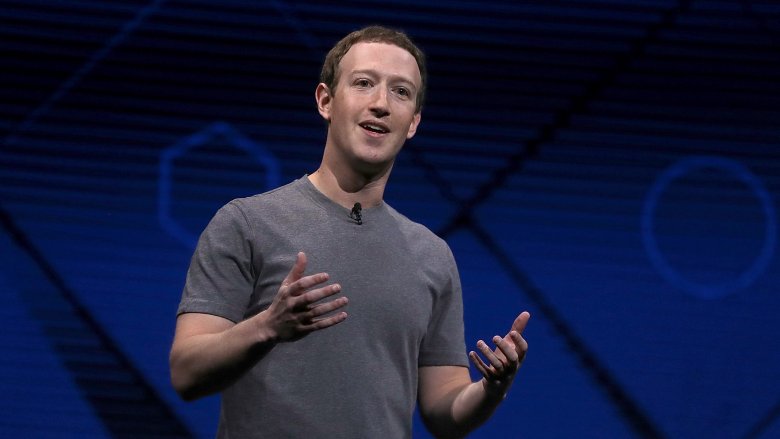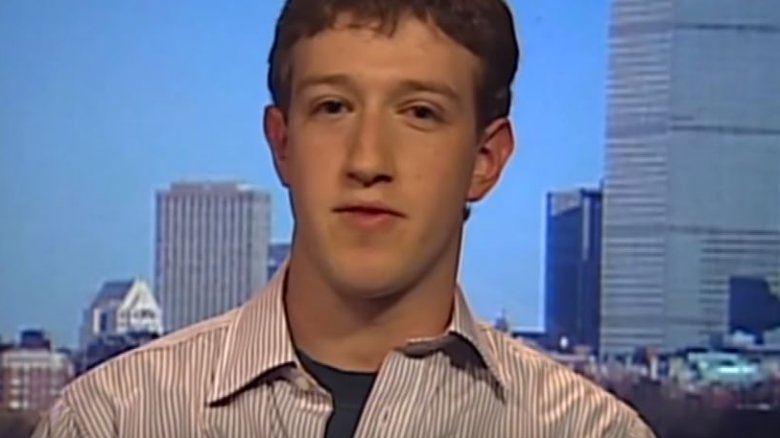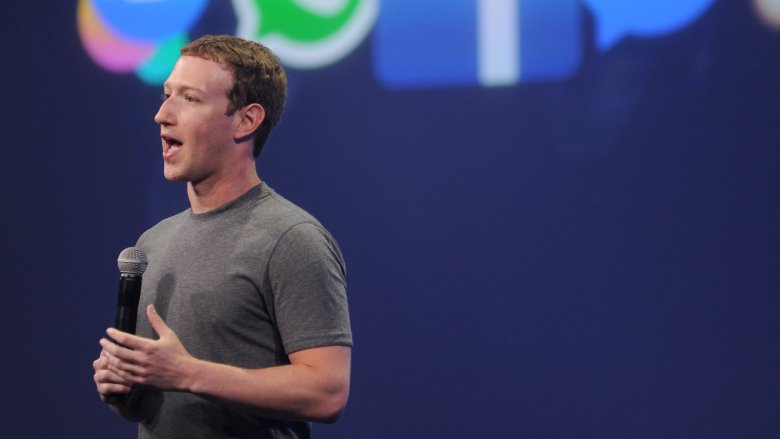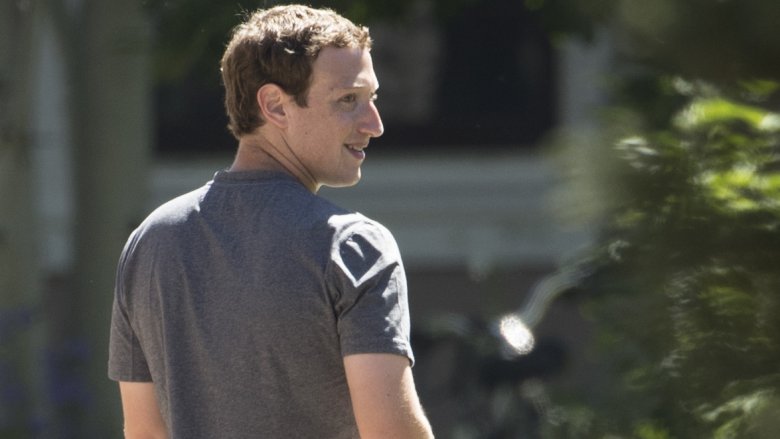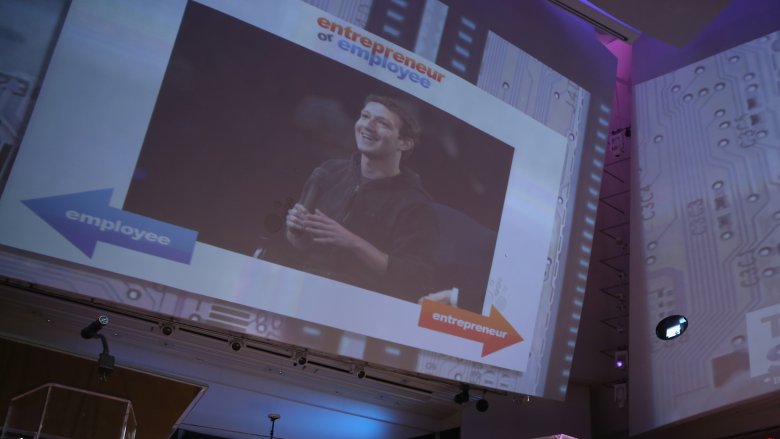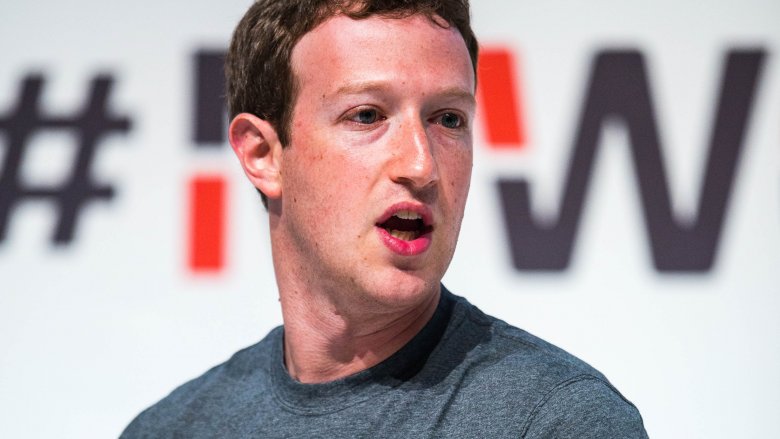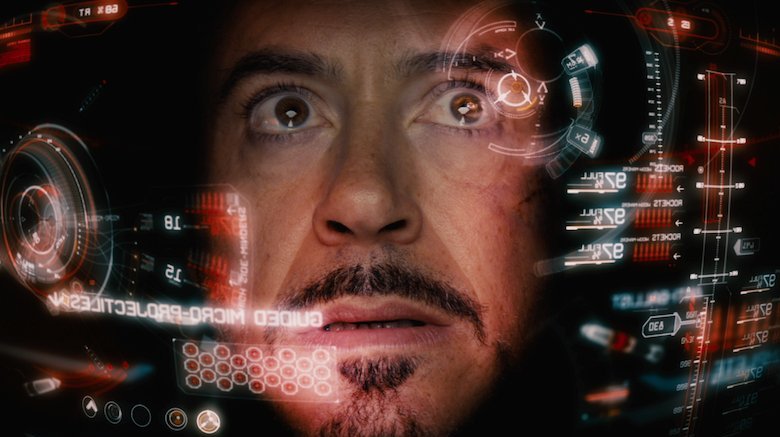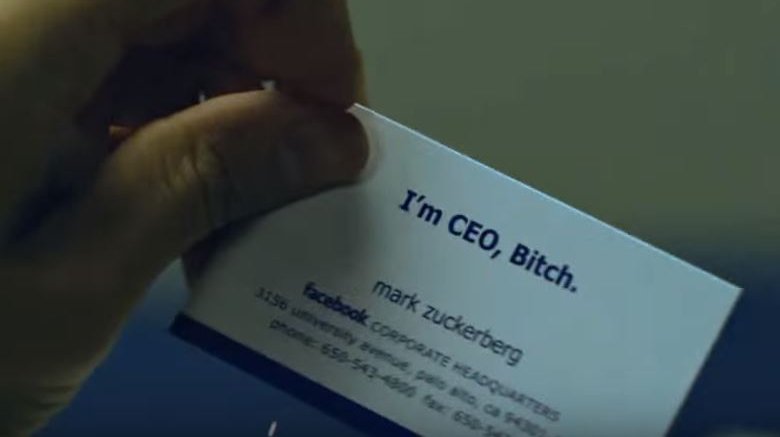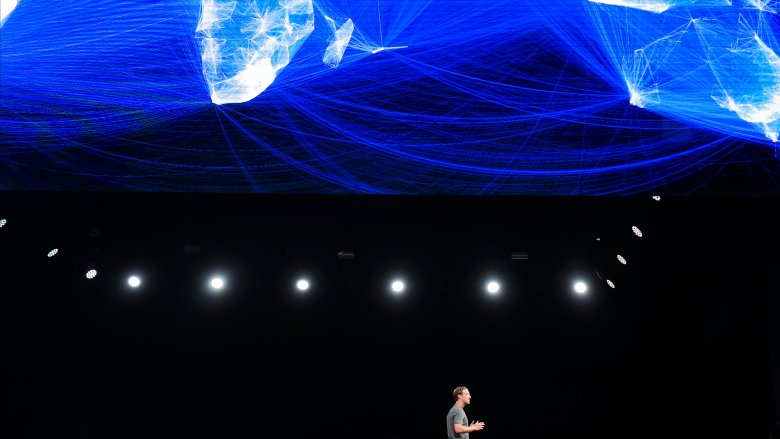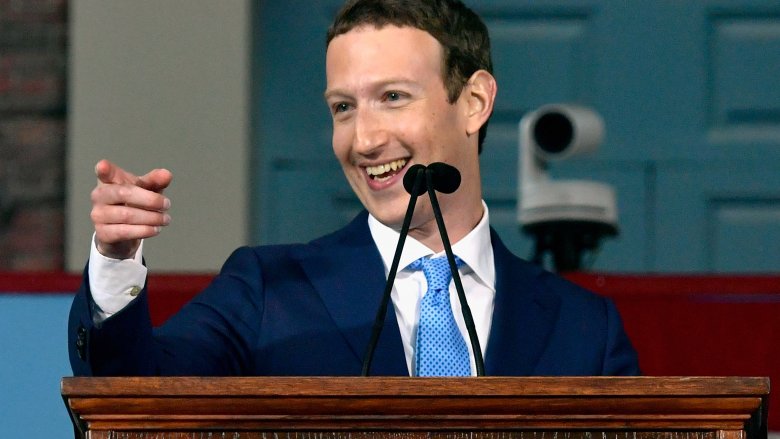Things You Didn't Know About Mark Zuckerberg
There aren't too many people on the planet with the fame and power of Mark Zuckerberg, the man who proved that you have thousands of friends just waiting to love, laugh, and "wow" at all your thoughts ... well, at least until the Facebook algorithm changes again, leaving you with only a few pitiful "likes" on that new cover photo. Zuckerberg's greatest creation, Facebook, has become as much a part of daily life as work, coffee, traffic intersections, and Game of Thrones.
Even though Zuckerberg has been a public figure for a long time — and despite the fact that he's the man who built his universe on the idea of sharing everything — Zuckerberg is a surprisingly quiet, introverted character, a genuine out-of-the-box thinker with a lot of interesting quirks, personality traits, and stories.
He was a child prodigy
Mark Zuckerberg was one of those genius kids born with a brain so big it's surprising his skull could contain it. Zuckerberg grew up in a Jewish family in New York. According to the New Yorker, his father was a dentist who earned the nickname "Painless Dr. Z" and whose own interest in Atari basic computer programming proved infectious to his young son.
One day in 1996, when Mark was 12, the elder Zuckerberg vented about his desire to give his dental practice a more advanced way of announcing patient arrivals rather than simply having the receptionist shout it out. This got the preteen Mark's head buzzing with possibilities, so he created a piece of software called ZuckNet — an instant messenger service that predated AIM by a year — which the receptionist could then use to announce new arrivals to Dr. Z.
It's impressive that a tween could beat AOL to the punch, but ZuckNet was only the beginning. As a kid, Zuckerberg loved creating his own video games, and his programming tutor David Newman described him as a "prodigy." As a high school senior, Zuckerberg invented Synapse, an artificial intelligence program that learned a user's musical tastes in order to recommend new music to them. Yes, he invented Pandora before Pandora did. Not surprisingly, both Microsoft and AOL attempted to scoop up Synapse and hire this smart kid for themselves, but Zuckerberg turned them both down. He saw greater achievements on the horizon.
People call him a 'robot'
Mark Zuckerberg is the king of social networks, but by all accounts, he's not that sociable. People who know Zuckerberg describe him as intense, aloof, and laser-focused on his inventions. Considering his intelligence, it's not surprising that he is called a "robot" fairly regularly, whether by friends, coworkers, or followers. The New Yorker describes his manner of speaking as resembling an instant message, with the same brisk, pointed directness. Facebook investor Reid Hoffman, when interviewed by the Washington Post, described the young CEO as extremely quiet, even during company meetings, because he's "always thinking."
One of the most commonly cited descriptions of Zuckerberg's personality emerged on Quora, when former Facebook employee Yishan Wong described Zuckerberg as having "a touch of the Asperger's." Wong explained this statement by saying that while Zuckerberg thoroughly listens to everyone, he doesn't give verbal or non-verbal cues that he's listening, making it seem as if he isn't. Wong added that he thinks Zuckerberg is a "perfectly nice guy," and Zuckerberg does seem to be widely approved of by his own employees: Facebook ranked second in Glassdoor.com's 2017 "Best Places to Work" list, and Zuckerberg himself earned an impressive 98 percent approval rating.
The New Yorker points out that in person, Zuckerberg is surprisingly charming and very self-aware of his perceived social imperfections. On stage, when asked if he acted the same with his friends as he does during public events, he told the audience, "Yeah, same awkward person."
He wears a gray T-shirt every day
For proof of how driven and focused Zuckerberg really is, one need only look at his wardrobe. Have you ever noticed that he wears the exact same thing every day?
Lest you think your eyes have been deceiving you, Zuckerberg has confirmed on multiple occasions that, yes, he wears a gray T-shirt almost every day of the year, sometimes with a dark hoodie over it. Why? Because he's too busy to think about what to wear. According to the Wall Street Journal, Zuckerberg purposely keeps his wardrobe minimalistic because it saves him the time and energy that would be wasted on thinking about what to wear. Hey, considering how successful the guy is, it makes sense.
Zuckerberg shared a photo of his closet on Facebook. Yes, it looks exactly like you'd expect. Business Insider reported that his gray cotton T-shirts cost up to $400 each. If you really want to copy his look, though, don't pay the full price. Zuckerberg replica T-shirts now retail for a somewhat more affordable $46, if you know where to look.
Though Zuckerberg's gray T-shirt is certainly his classic costume, he does dress up for special occasions. For example, Quartz pointed out that in 2009, he wore a suit and tie every day of the year as a symbolic statement that Facebook would keep pushing forward, hiring new people, and making progress during the Great Recession, rather than cutting back as other companies were doing.
He's colorblind
Facebook might be one of the biggest websites in the world, but the design isn't necessarily exciting. Sure, it's functional. It works well, and it's easy to understand. But what's with all the blue?
Well, everything has a reason. According to the New Yorker, Mark Zuckerberg is actually red-green colorblind. (That might also explain his fondness for those gray shirts.) Colorblindness is much more complex than many people realize. While Color-Blindness.com explains that there are people who perceive the world around them like an old black-and-white Bogart movie, a condition called "monochromacy," the more common form of colorblindness is a deutan deficiency, which Zuckerberg has. The colors red and green look the same, coming through as shades of yellow. Zuckerberg didn't realize his colorblindness until he was an adult, though he says colors aren't something he worries much about.
Zuckerberg says blue is the color that pops out the most to him, because he can see all its shades. The New Yorker profile described the CEO's house as being painted in lots of blue and beige, except for a bright yellow kitchen. Maybe Facebook will add some bright yellow widgets to go along with all that blue. Don't expect Christmas colors to pop up anytime soon, though.
His views on privacy have often come under fire
Since Facebook took over the world, to the point of inspiring dystopian stories like The Circle, Mark Zuckerberg's take on "privacy" has often been a maelstrom of controversy.
There's no question that the advent of social networks like Facebook, not to mention its granddaddy MySpace, has completely obliterated past notions of privacy. Now, billions of people across the planet share all kinds of personal details in a way that was once incomprehensible. Back in the day, Facebook was unique among its peers for requiring a person's real name — unlike MySpace, where your username could be "Mutant Mashed Potato King" if you wanted. (And oh, how you wanted.) Zuckerberg's core personal philosophy is that "information wants to be shared," according to the Washington Post. He's spoken at length about his hope and belief that Facebook can change society to be more open, connected, and understanding. This philosophy is why he does what he does.
However, as Facebook has grown more and more ubiquitous, the company has stirred up quite a few controversies with a series of not-always-so transparent decisions on who gets access to what, with Zuckerberg as the lightning rod for complaints. The Washington Post pointed out the infuriated response that Facebook received on multiple occasions for rolling out new privacy-altering features without warning people beforehand, and the company's methods of displaying news coverage caused The Guardian to announce that 2016 was the year Facebook became "the bad guy."
He's not a fan of the movie about him
You know you're a big deal when massive filmmakers like Aaron Sorkin and David Fincher team up to make a movie about you. The Social Network, starring Jesse Eisenberg, tells the story of Zuckerberg's fallout with Facebook co-founder Eduardo Saverin. The movie received a lot of acclaim and a backpack full of awards, and is often cited as being a source of inspiration for many startups and entrepreneurs. One guy who's not a fan, though, is Zuckerberg himself.
According to Business Insider, leaked emails from the 2014 Sony hack reveal that Zuckerberg was so against the movie's creation that he urged producers to stop production. When the film did come out, he wasn't thrilled. According to The Guardian, he found the movie's depiction of his life to be "hurtful," adding that the filmmakers "made up a bunch of stuff" to make his story more dark and glamorous than it really was.
The film's screenwriter, Aaron Sorkin, holds a different view. In an interview with Groucho Reviews, Sorkin said he and Fincher tried to be as accurate as possible, down to correctly portraying what kind of beer Zuckerberg drank when he posted a certain blog. In Sorkin's words, "There was nothing in the movie that was invented for the sake of making it sensational. There was nothing in the movie that was Hollywood-ized." However, in a Today interview, Sorkin did make a point to apologize for hurting Zuckerberg's feelings.
He once mocked Facebook users for uploading private information
Every teenager makes embarrassing mistakes. One of the scariest things about Facebook is that those humiliating photos from when 15-year-old you made lewd gestures at a statue can now re-emerge on the internet at any moment, without warning, fully displayed to all of your coworkers and in-laws. Oops.
However, while Facebook might be the author of these awkward conversations, Mark Zuckerberg had his young adult problems displayed on the big screen for millions. That's why Aaron Sorkin admitted to Today that he understood Zuckerberg's frustration, saying "I get it completely. I know that I wouldn't want a movie made about the things I did when I was 19 years old, so I get it."
However, not all of Zuckerberg's adolescent mistakes made it into the movie. A rather unpleasant exchange from Facebook's early days leaked online in 2010, as reported by Business Insider. When Zuckerberg was 19, right after inventing his new social network, he had an instant messenger conversation with a friend where he bragged about having "over 4,000 emails, pictures, addresses, SNS." When Zuckerberg's friend asked why in the world people would give him their private information, Zuckerberg responded, "People just submitted it. I don't know why. They 'trust me.' Dumb f–ks."
Oops. Yeah, not so pleasant. As an adult, Zuckerberg told the New Yorker that he regrets this IM exchange, even calling it immature and saying he's grown up a lot since then.
He invented his own J.A.R.V.I.S.
If you're into comic books or science-fiction movies, when you hear "Jarvis," you think of Iron Man. The billionaire Marvel superhero played by Robert Downey Jr. has his armor, mansion, and all his devices managed by an artificial intelligence named J.A.R.V.I.S., who acts as a sort of robotic butler that opens doors for him, looks up information, or sometimes just gives him someone to chat with. According to Entrepreneur.com, it turns out that Mark Zuckerberg liked this idea so much that he made his own Jarvis. And yes, that's right, he named it Jarvis.
Zuckerberg's Jarvis is customized to the billionaire's house, where Jarvis is designated by voice and text commands to control the house's doors, lights, and air conditioning, as well as bringing him his gray shirts, teaching his daughter Mandarin, and even using facial recognition software to determine when to let people into the house. Zuckerberg stated that Jarvis could be a foundation for a new project someday, maybe — but really, he just designed it as a fun side project for his own house. Tony Stark would probably approve.
One additional feature: when Jarvis speaks back to Zuckerberg, it does so in the famous voice of Morgan Freeman. Not an imitator or a computer simulation, either. Zuckerberg hired the real Morgan Freeman to perform the voice of his house's special artificial intelligence system.
His business card used to say 'I'm CEO ... bitch.'
Yes, Mark Zuckerberg really did carry around business cards that announced him with the title, "I'm CEO ... bitch." (Ellipsis in real life, comma in the movie, for you eagle-eyed readers.) So it appears that despite accusations of being a robot, Zuckerberg clearly does have a sense of humor. According to a Quora answer by Bryan Veloso, the former Facebook creative director who designed the now-famous cards, the phrase originated as something that Zuckerberg actually once said at a meeting, during a time when he was trying to emulate Steve Jobs' aggressive management style.
Feeling comfortable with his boss, Veloso stuck the quoted phrase on Zuckerberg's card, and the CEO evidently liked it enough that he began carrying the cards around to give to people. According to TechCrunch, these business cards only added to the wild and crazy reputation that the Facebook kids enjoyed in Silicon Valley, though Zuckerberg did make a point to carry two separate sets of cards on him for meetings: the ones with the "bitch" slogan, and the boring ones.
The cards were also discussed by Andrew Bosworth, who stated he was one of Zuckerberg's former professors and eventually a Facebook employee. Bosworth said the cards were mainly just an inside joke that Zuckerberg shared with his friends, and that his usage of them makes a clear case that Zuckerberg initially had no idea just how huge Facebook would one day become.
He's surprisingly religious
Mark Zuckerberg comes from a Jewish background. However, after becoming an adult, he seems to have strayed from these roots, and it became fairly accepted knowledge that he was an atheist. Religion isn't a subject that he's talked about much through the years, since he tends to be focused on the subjects that made him famous.
That all changed at the end of 2016, according to the Huffington Post, when Zuckerberg shared a Facebook post wishing all of his friends a "Merry Christmas and Happy Hannukah." Taken on its own, this online holiday card would seem to be fairly secular, but one Facebook commenter made a point to ask Zuckerberg, "Aren't you an athiest?" Zuckerberg commented back with the surprising revelation that, actually, he wasn't an atheist at all. He claims that after being raised Jewish, he spent a long time "questioning things" but that in more recent times he had come to believe that "religion is very important." Zuckerberg didn't clarify exactly what faith he practiced, or whether it was an organized religion or more of a solitary spiritual thing, but it's worth noting that he has praised Buddhism on multiple occasions, which happens to be the faith that his wife, Priscilla Chan, practices.
Either way, Zuckerberg's reveal added fuel to the fire of a certain theory that's been going around for a long while now...
He's not running for president (or so he says)
Could President Zuckerberg be in our future? Could the 2020 election see the controversial Facebook wunderkind propel himself into the White House, becoming the youngest U.S. president in history?
There's been a lot of discussion about this point, and a lot of evidence. For one, as the New York Times points out, Zuckerberg spent a good portion of 2017 on a "Great American Road Trip," where he visited all over the United States to better understand all the people who use his website. Then in August, according to Politico, Zuckerberg and Priscilla Chan actually hired presidential candidate Hillary Clinton's former pollster, Joel Benenson, to work as their consultant for a philanthropic initiative that will donate 99 percent of their Facebook shares to charity. Surely, just a coincidence. If Zuckerberg did run, The Guardian points out that he would almost certainly be a controversial candidate, given the many privacy and transparency disputes Facebook has been embroiled in over the years.
Zuckerberg attempted to throw cold water on these speculations when he wrote on his Facebook page that no, he's not running for office. Of course, saying you aren't running for a while is practically a required step for campaigning these days. Whether Zuckerberg has actually considered a run for the White House or not, it's unlikely these rumors will ever stop swirling around him.
